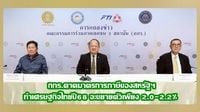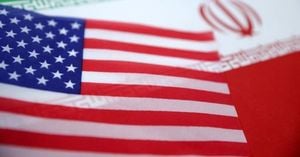In a recent meeting of the Joint Standing Committee on Commerce, Industry, and Banking (JSCCIB), Mr. Kriangkrai Thiennukul, Chairman of the Federation of Thai Industries (F.T.I.), expressed significant concerns regarding the impact of U.S. trade policies and the strengthening Thai baht on the nation’s economy. The committee predicts that Thailand’s economic growth for 2025 will be lower than previously expected, estimating a growth rate of between 2.0% and 2.2%, down from earlier forecasts of 2.4% to 2.9%.
The International Monetary Fund (IMF) has also revised its global GDP growth forecast for 2025, lowering it from 3.3% to 2.8%. This decline in growth expectations is compounded by the ongoing trade war, which is anticipated to result in a mere 1.7% increase in global trade volume. This figure is notably lower than the growth seen during the European crisis in 2011, indicating a precarious economic landscape ahead.
Mr. Thiennukul warned that if the U.S. imposes retaliatory tariffs of 36% on Thai exports, the value of exports to the U.S. could plummet, potentially costing Thailand around 1.4 trillion baht over the next decade. He emphasized that such tariffs would severely impact small and medium-sized enterprises (SMEs), putting approximately 3.7 million jobs at risk.
Under a scenario where a 10% tariff is applied in the second quarter of 2025, the overall export growth for the year is expected to stagnate at only 0.3% to 0.9%, a stark decline from the earlier forecast of 1.5% to 2.5%. Inflation is also projected to remain low, between 0.5% and 1.0%, further complicating the economic outlook.
Should the U.S. impose the full 36% tariff later in the year, the GDP growth for 2025 could drop to between 0.7% and 1.4%, with total exports potentially contracting by as much as 2%. The committee estimates that the adverse effects of the trade war could create a substantial income gap of around 1.6 trillion baht over the next five years.
In light of these challenges, the JSCCIB is urging the Thai government to engage in negotiations with the U.S. to mitigate tariff impacts and enhance the competitiveness of Thai businesses in an increasingly cutthroat market.
Moreover, the committee has expressed the need for protective measures against the influx of imports that could surge due to the trade diversion caused by U.S. tariffs. They advocate for the government to implement safeguard measures that would shield local producers from the adverse effects of increased imports.
To facilitate better trade management, the JSCCIB is recommending the integration of digital systems, such as e-Government, to analyze and monitor trade data effectively. They propose that the government should be prepared to initiate investigations promptly if there is a significant increase in imports beyond normal levels.
Additionally, the committee is addressing the issue of export product certification, particularly for goods sent to the U.S. Prime Minister discussions with the Ministry of Commerce and the Federation of Thai Industries have led to a consensus to tighten the issuance of Certificates of Origin (C/O) to prevent misuse, particularly for the 65 products currently under scrutiny.
In the face of these economic hurdles, the JSCCIB is also keeping a close watch on the exchange rate of the baht, which has recently strengthened to around 32.5 to 32.7 baht per dollar. This rise in value is seen as detrimental to the competitiveness of Thai businesses.
The committee advocates for measures to stabilize the baht and prevent rapid fluctuations, which could further complicate the business environment. They also emphasize the importance of effectively passing on the benefits of a stronger baht, such as lower energy and raw material costs, to both the production sector and consumers.
As part of ongoing legislative efforts, the Thai Parliament is currently reviewing a new bankruptcy bill aimed at improving the restructuring processes for SMEs with debts not exceeding 50 million baht. This legislation is expected to have widespread implications, introducing principles that have not previously been implemented in Thailand.
Concerns have been raised regarding the potential reduction of liability for guarantors as a result of automatic restructuring processes, which could impact the overall creditworthiness of the financial system. This situation poses risks to financial discipline and access to new loans for SMEs lacking collateral.
In summary, the challenges posed by U.S. tariffs and the strengthening baht are creating a precarious situation for Thailand’s economy, particularly for its SMEs. The JSCCIB is urging the government to take swift action to engage in negotiations with the U.S. while also implementing measures to protect local businesses and ensure economic stability moving forward.





